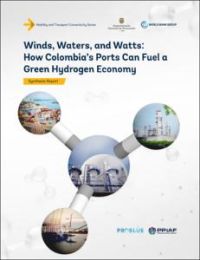News
Winds, Waters, and Watts: How Colombia’s Ports Can Fuel a Green Hydrogen Economy
The World Bank Repository
The report, ‘Winds, Waters, and Watts: How Colombia’s Ports Can Fuel a Green Hydrogen Economy’ was launched in collaboration with The World Bank, DNP, HINICIO, and Cenit. The document analyses how the country can become a key player in the global green hydrogen economy. With ports and maritime transport as its central focus, the report identifies investment opportunities on the Caribbean coast, examines the potential for the production, storage and export of clean…
We are excited to start a new project on: Trade and circular economy opportunities for port infrastructure, as partners of a collaboration of The University of Queensland (UQ) and North Queensland Bulk Ports Corporation Limited (NQBP) as part of the iMOVE Australia (https://lnkd.in/eCzQwjvt) programm to explore future-proofing strategies for alternative fuels, integrated with circular economy principles, at the Port of Mackay and its associated infrastructure.
Gordon Wilmsmeier explains the effect of abrupt fluctuations in global demand on container transport capacity, affecting routes, equipment availability, and frequency at Latin American ports.
In a recent interview with DVZ, Professor Gordon Wilmsmeier, Director of the Kühne Professorial Chair in Logistics – Universidad de los Andes, shared his insights on the complexities of IMO decision-making and the potential impact of a flat-rate CO₂ tax on global shipping.
The container route between Germany and Latin America
Deutsche Welle
From a banana to a German supermarket, or a car to a Latin American port, a complex logistics chain is needed, and its operation is currently facing serious challenges.
Chancay Port: New route between China and South America
Deutsche Welle
Modern, automated and capable of handling large vessels, the new Peruvian terminal aims to be a gateway to Asia for South America. What impact could it have on regional trade and geopolitics?
‘Challenges of the next port concessions are of a much greater magnitude than those of 30 years ago’.
Mundo Marítimo
Important ports in Latin America are about to begin the renewal of their concessions, a process that the leading analyst of the maritime-port industry, Ricardo Sanchez, observes with deep concern, given the magnitude of the challenge in terms of the investments required and the approach that this new stage will have.
A new conception of port governance under climate change
PortEconomics
In their latest paper, Jason Monios, Gordon Wilmsmeier – together with Gustavo Andres Martínez Tello, and Lara Pomaska -explore the evolving landscape of port governance in the context of climate change.
Ricardo Sánchez: ‘The density of events impacting global logistics has increased in the last 8 years’.
PortalPortuario
The intensity and frequency of disruptive events of global impact has increased in recent years, reducing the time of ‘stability’ or ‘normality’. A case in point is Russia’s invasion of Ukraine, a war that – for the time being and almost three years after its start – has no prospect of an end.
Dr Ricardo J Sanchez, Co-Director of the Kühne Professorial Chair in Logistics – Universidad de los Andes, presented the basis document of the Foro Fluvial Sudamericano, which not only provides an analysis of the current state of South America’s waterways, but also proposes a new paradigm to maximise the use of these currently under-utilised waterways to improve hashtag#logistics infrastructure and mobility in the region.
Maritime integrity: an international debate on how best to advance the integrity of maritime supply chains
PortEconomics
The Maritime Anti-Corruption Network, the Center for Shipping and Global Logistics at Kuehne Logistics University, the Facultad de Administracion, Universidad De Los Andes, and the Laboratory of Integrated Port Economy, University of Piraeus are holding an in-person event in Hamburg to promote inter-industry dialogue on tackling corruption in seaports and terminals and discuss how best to advance integrity in maritime supply chains building on work on the Global P…
A Uniandes project implemented a school boat for students from three villages in the bay.
A zero-emission future is possible in Colombia
Revista Semana
Thanks to technological advances and the development of new vehicles, the transport sector is exploring new ways to make its operation environmentally sustainable.
In the municipality of Santa Bárbara de Iscuandé, families spend up to 12 hours a day fishing, and petrol costs can exceed 150,000 pesos per day. Geographer Gordon Wilmsmeier developed a project that aims to replace petrol engines with electric ones, helping to reduce pollution.
Santa Barbara de Iscuandé relies only on aquatic mobility for all transportation activities and the economy is based almost entirely on fishing and mangrove resource recollection. Given these scenarios, electric mobility rises as an alternative capable of enhancing people’s quality of life at the same time it helps sustainably preserve ancestral practices.
In Santa Bárbara, Iscuandé (Nariño), piangua fisherwomen faced difficulties in traveling to and reaching the mangroves.
Four boats in Santa Bárbara de Iscuandé in Nariño are powered by batteries. Thanks to this, 25 women who hunt piangua do not waste fuel and do not row extensively. Behind it is a decade of effort at the hands of a German.
Notas de prensa
